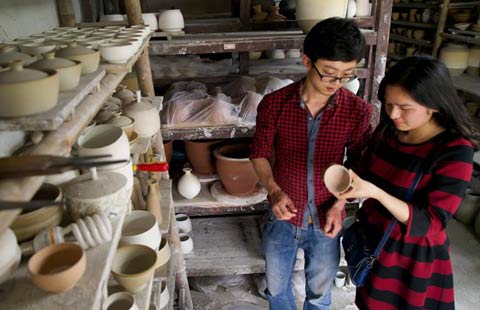China-aided highway changes life of Pakistanis
(Xinhua) Updated: 2015-04-20 10:20ISLAMABAD - "I really love working here for the Chinese company," Abass Ali, a Pakistani employee of the China Road and Bridge Corporation (CRBC), told Xinhua at a construction site next to a barrier lake that is two hours drive from the northern city of Gilgit.
The ongoing construction work by the CRBC is the last phase of a project undertaken by the Chinese company to renovate a 335-km stretch of the Karakoram Highway, the only overland connection between China and Pakistan at present.
The highway, built with fund from China during 1966-1978, is the only economic lifeline for Pakistan's northern region. Hundreds of Chinese engineers died while building the road.
Ali and two of his brothers have been working for the CRBC since 2008 when the CRBC started to upgrade a section of the highway that became increasingly dilapidated because of poor maintainance.
Salaries from the job at CRBC made it possible for Ali and his brothers each to build their own houses, and allow them to buy a car for their father. Meanwhile, they also use part of the money they received from the Chinese company to support the education of their two younger siblings.
According to Ali, who works as a driver for the CRBC, his two brothers were first hired as general laborers for the company because they were then without any specific skills.
The company then trained them respectively to operate loader and cement mixer, and they were moved to the higher-paid new positions afterward, Ali said.
Ali's family is among the thousands of local families that have seen their lives changing for the better thanks to job opportunities at the CRBC.
The Chinese company employs as many as 4,000 locals during the busy months of the project and it has also trained thousands of locals to be engineers or technicians.
However, there is still a larger picture as to the significance of the road project: it is estimated that by September this year, the central section of the Karakoram Highway that has been blocked after a massive landslide five years ago will be reopened for traffic and that would halve the travel time from the Raikot Bridge to the Khunjerab Pass to seven hours, said Wen Gang, chairman of the CRBC board of directors.
The renovated highway will greatly contribute to China-Pakistan cooperation in trade, energy, and boost social and economic development along the route, said Wen.
Sikandar Sultan Raja, former chief secretary of Pakistan's northern region of Gilgit-Baltistan, also hailed the enormous potential of the newly renovated highway.
While noting that the 2010 landslide blocked the highway and that has dented bilateral trade via road in the past few years, he said the soon-to-come unobstructed traffic along the route will allow larger areas in both China and Pakistan to achieve win-win results and common development.
- Toyota releases TwinEngine cars and sets 2020 target
- No more foot-dragging in IMF reform
- New Yorker sends honey from 'heaven' to Shanghai
- IMF's review on inclusion of yuan in SDR basket underway
- IMF official says China's growth slower but safer
- Heiress harmonizes hot pot with organic farming
- Lock-up shares worth 34.5b yuan to become tradable
- China aims to make RMB more freely usable

















